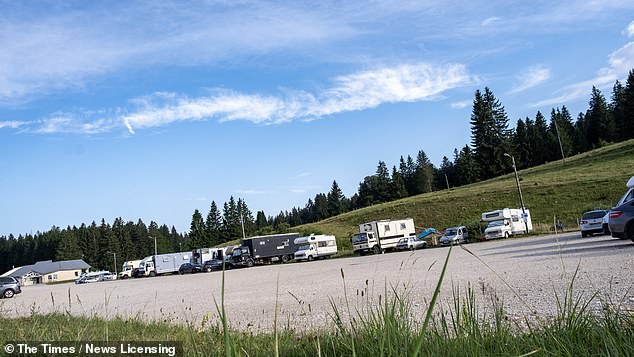Picture this: You’re a skilled worker in France, but you can’t quite make ends meet.
Then you realize that just across the border, in Switzerland, the pay is nearly double—or even more.
So, you pack your things, maybe even move into a caravan, and commute across the border every day for better pay.
It may sound extreme, but this is the new reality for thousands of French citizens.
A Surge in Cross-Border Commuters Seeking Higher Wages
The idea of working in Switzerland while living in France has exploded in popularity.
In 2025 alone, over 230,000 French workers made daily trips into Switzerland for work—more than twice the number from just two decades ago.
The appeal? Swiss salaries are significantly higher, but the cost of living in France remains lower.
It’s a financial win-win—at least on the surface.
Alpine Villages Feeling the Pressure
Small French towns along the eastern border, like Les Fourgs, are seeing major changes.
According to Mayor Roger Belot, his once quiet Alpine village has become overrun with cross-border workers.
The local population hasn’t just grown—it’s shifted.
Housing is scarce, food banks are under pressure, and even essential services are losing staff as people chase Swiss paychecks.
In winter, tourist parking lots were filled not with vacationers, but with vans and caravans where workers slept.
The mayor is now using village funds to provide formal campsites just to manage the influx, charging for access to water and electricity in an attempt to create some order.
Life in a Van, Pay in Swiss Francs
Yes, living in a van during freezing winters may seem like a tough choice.
But for many, it’s worth it.
With France’s unemployment rate at 7.4% and a median monthly salary of just €2,735, it’s no wonder people are willing to rough it.
Compare that to CHF 6,788—roughly £6,249—the median monthly gross salary in Switzerland.
Even the €400 (~£344) monthly fee the mayor wants to charge for the campsite represents only 5.5% of a Swiss median salary, versus 15% of a French one.
Property Prices Skyrocket and Locals Feel Squeezed
Les Fourgs isn’t alone.
In Pontarlier, a nearby town, nearly 30% of the 18,000 residents now work across the Swiss border.
The result?
French locals are watching property prices soar to levels you’d expect in Paris, driven up by workers flush with Swiss cash.
This border hustle isn’t just a French phenomenon either.
Workers from Italy, Germany, and Austria are also flooding into Switzerland.
In early 2025, around 405,000 people commuted into the country for work.
Over half were French.
The Welfare Dilemma: Who Should Pay the Price?
While cross-border work is legal and long-established, the sheer volume of workers is becoming a strain on France’s welfare system.
If a French worker loses a job in Switzerland, France has historically paid unemployment benefits—based on their Swiss salary.
That’s cost the French government €800 million annually.
To combat this, new rules kicked in on April 1.
Now, jobless benefits for these workers are calculated based on French salary standards, not Swiss ones.
This has understandably sparked pushback and concern from workers who feel caught in the middle.
“Frontaliers” Build Communities, Online and Off
Despite the complications, interest continues to grow.
Online forums, Facebook groups, and blogs are buzzing with advice on how to snag a Swiss job while staying rooted in France.
One user recently asked how much they should expect to earn in an IT support role near the border, even though they already had a stable remote job in France.
The answer?
Anything over CHF 80,000 (£73,639) is a solid offer—especially if you’re living on the French side, where taxes, rent, and groceries are all significantly cheaper.
For comparison, an IT support worker in Paris might only earn around €40,500 (£34,859).
Cross-Border Working: Legal, But With Limits
Thanks to agreements between France and Switzerland dating back to 1983, this cross-border lifestyle is entirely legal.
Workers need a G permit, which their Swiss employer applies for, and they must return to France at least once a week.
After 12 years, they can even apply for Swiss citizenship—without giving up their French nationality.
This system isn’t limited to Switzerland.
Because of EU free movement rules, French citizens can easily live and work in neighboring countries like Germany or Belgium too, though benefits and salaries may vary.
Switzerland’s Quiet Resistance to the Worker Influx
Switzerland has reasons to welcome these workers—after all, the country has a shrinking, aging population.
But not everyone is happy.
Long-time French commuters say newcomers are making them look bad and lowering the standards.
Swiss locals have also voiced concerns, particularly about job competition and overcrowded public services.
One recent controversy involved a local pool that decided to limit entry to only Swiss nationals and valid permit holders—reportedly in response to the rising number of French residents using the facility.
The Cross-Border Boom Is Changing the Region
There’s no denying that this wave of “frontaliers” is reshaping life along the French-Swiss border.
What started as a clever way to beat unemployment and boost personal income is now a social and economic force with far-reaching consequences—on both sides of the line.
What’s Next for the French-Swiss Worker Trend?
As policies shift and costs rise, one question looms: Will this trend keep growing—or will it reach a breaking point?
For now, people are still flocking to the border in search of a better life.
But with rising tensions, new regulations, and pressure on local communities, the long-term future of this lifestyle remains uncertain.
One thing’s for sure—it’s a phenomenon that’s impossible to ignore.



